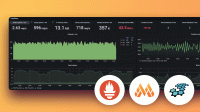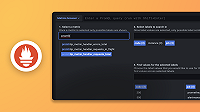pyroscope.write
pyroscope.write receives performance profiles from other components and forwards them to a series of user-supplied endpoints using Pyroscope’ Push API.
Multiple pyroscope.write components can be specified by giving them different labels.
Usage
pyroscope.write "LABEL" {
endpoint {
url = PYROSCOPE_URL
...
}
...
}Arguments
The following arguments are supported:
| Name | Type | Description | Default | Required |
|---|---|---|---|---|
external_labels | map(string) | Labels to add to profiles sent over the network. | no |
Blocks
The following blocks are supported inside the definition of pyroscope.write:
| Hierarchy | Block | Description | Required |
|---|---|---|---|
| endpoint | endpoint | Location to send profiles to. | no |
| endpoint > basic_auth | basic_auth | Configure basic_auth for authenticating to the endpoint. | no |
| endpoint > authorization | authorization | Configure generic authorization to the endpoint. | no |
| endpoint > oauth2 | oauth2 | Configure OAuth2 for authenticating to the endpoint. | no |
| endpoint > oauth2 > tls_config | tls_config | Configure TLS settings for connecting to the endpoint. | no |
| endpoint > tls_config | tls_config | Configure TLS settings for connecting to the endpoint. | no |
The > symbol indicates deeper levels of nesting.
For example, endpoint > basic_auth refers to a basic_auth block defined inside an endpoint block.
endpoint block
The endpoint block describes a single location to send profiles to.
Multiple endpoint blocks can be provided to send profiles to multiple locations.
The following arguments are supported:
| Name | Type | Description | Default | Required |
|---|---|---|---|---|
url | string | Full URL to send metrics to. | yes | |
name | string | Optional name to identify the endpoint in metrics. | no | |
remote_timeout | duration | Timeout for requests made to the URL. | "10s" | no |
headers | map(string) | Extra headers to deliver with the request. | no | |
min_backoff_period | duration | Initial backoff time between retries. | "500ms" | no |
max_backoff_period | duration | Maximum backoff time between retries. | "5m" | no |
max_backoff_retries | int | Maximum number of retries. 0 to retry infinitely. | 10 | no |
bearer_token_file | string | File containing a bearer token to authenticate with. | no | |
bearer_token | secret | Bearer token to authenticate with. | no | |
enable_http2 | bool | Whether HTTP2 is supported for requests. | true | no |
follow_redirects | bool | Whether redirects returned by the server should be followed. | true | no |
proxy_url | string | HTTP proxy to send requests through. | no | |
no_proxy | string | Comma-separated list of IP addresses, CIDR notations, and domain names to exclude from proxying. | no | |
proxy_from_environment | bool | Use the proxy URL indicated by environment variables. | false | no |
proxy_connect_header | map(list(secret)) | Specifies headers to send to proxies during CONNECT requests. | no |
At most, one of the following can be provided:
no_proxy can contain IPs, CIDR notations, and domain names. IP and domain names can contain port numbers.
proxy_url must be configured if no_proxy is configured.
proxy_from_environment uses the environment variables HTTP_PROXY, HTTPS_PROXY and NO_PROXY (or the lowercase versions thereof).
Requests use the proxy from the environment variable matching their scheme, unless excluded by NO_PROXY.
proxy_url and no_proxy must not be configured if proxy_from_environment is configured.
proxy_connect_header should only be configured if proxy_url or proxy_from_environment are configured.
When multiple endpoint blocks are provided, profiles are concurrently forwarded to all configured locations.
basic_auth block
| Name | Type | Description | Default | Required |
|---|---|---|---|---|
password_file | string | File containing the basic auth password. | no | |
password | secret | Basic auth password. | no | |
username | string | Basic auth username. | no |
password and password_file are mutually exclusive, and only one can be provided inside a basic_auth block.
authorization block
| Name | Type | Description | Default | Required |
|---|---|---|---|---|
credentials_file | string | File containing the secret value. | no | |
credentials | secret | Secret value. | no | |
type | string | Authorization type, for example, “Bearer”. | no |
credential and credentials_file are mutually exclusive, and only one can be provided inside an authorization block.
oauth2 block
| Name | Type | Description | Default | Required |
|---|---|---|---|---|
client_id | string | OAuth2 client ID. | no | |
client_secret_file | string | File containing the OAuth2 client secret. | no | |
client_secret | secret | OAuth2 client secret. | no | |
endpoint_params | map(string) | Optional parameters to append to the token URL. | no | |
proxy_url | string | HTTP proxy to send requests through. | no | |
no_proxy | string | Comma-separated list of IP addresses, CIDR notations, and domain names to exclude from proxying. | no | |
proxy_from_environment | bool | Use the proxy URL indicated by environment variables. | false | no |
proxy_connect_header | map(list(secret)) | Specifies headers to send to proxies during CONNECT requests. | no | |
scopes | list(string) | List of scopes to authenticate with. | no | |
token_url | string | URL to fetch the token from. | no |
client_secret and client_secret_file are mutually exclusive, and only one can be provided inside an oauth2 block.
The oauth2 block may also contain a separate tls_config sub-block.
no_proxy can contain IPs, CIDR notations, and domain names. IP and domain names can contain port numbers.
proxy_url must be configured if no_proxy is configured.
proxy_from_environment uses the environment variables HTTP_PROXY, HTTPS_PROXY and NO_PROXY (or the lowercase versions thereof).
Requests use the proxy from the environment variable matching their scheme, unless excluded by NO_PROXY.
proxy_url and no_proxy must not be configured if proxy_from_environment is configured.
proxy_connect_header should only be configured if proxy_url or proxy_from_environment are configured.
tls_config block
| Name | Type | Description | Default | Required |
|---|---|---|---|---|
ca_pem | string | CA PEM-encoded text to validate the server with. | no | |
ca_file | string | CA certificate to validate the server with. | no | |
cert_pem | string | Certificate PEM-encoded text for client authentication. | no | |
cert_file | string | Certificate file for client authentication. | no | |
insecure_skip_verify | bool | Disables validation of the server certificate. | no | |
key_file | string | Key file for client authentication. | no | |
key_pem | secret | Key PEM-encoded text for client authentication. | no | |
min_version | string | Minimum acceptable TLS version. | no | |
server_name | string | ServerName extension to indicate the name of the server. | no |
The following pairs of arguments are mutually exclusive and can’t both be set simultaneously:
ca_pemandca_filecert_pemandcert_filekey_pemandkey_file
When configuring client authentication, both the client certificate (using
cert_pem or cert_file) and the client key (using key_pem or key_file)
must be provided.
When min_version is not provided, the minimum acceptable TLS version is
inherited from Go’s default minimum version, TLS 1.2. If min_version is
provided, it must be set to one of the following strings:
"TLS10"(TLS 1.0)"TLS11"(TLS 1.1)"TLS12"(TLS 1.2)"TLS13"(TLS 1.3)
Exported fields
The following fields are exported and can be referenced by other components:
| Name | Type | Description |
|---|---|---|
receiver | receiver | A value that other components can use to send profiles to. |
Component health
pyroscope.write is only reported as unhealthy if given an invalid configuration.
In those cases, exported fields are kept at their last healthy values.
Debug information
pyroscope.write does not expose any component-specific debug information.
Example
pyroscope.write "staging" {
// Send metrics to a locally running Pyroscope instance.
endpoint {
url = "http://pyroscope:4040"
headers = {
"X-Scope-OrgID" = "squad-1",
}
}
external_labels = {
"env" = "staging",
}
}
pyroscope.scrape "default" {
targets = [
{"__address__" = "pyroscope:4040", "service_name"="pyroscope"},
{"__address__" = "alloy:12345", "service_name"="alloy"},
]
forward_to = [pyroscope.write.staging.receiver]
}Compatible components
pyroscope.write has exports that can be consumed by the following components:
- Components that consume Pyroscope
ProfilesReceiver
Note
Connecting some components may not be sensible or components may require further configuration to make the connection work correctly. Refer to the linked documentation for more details.



